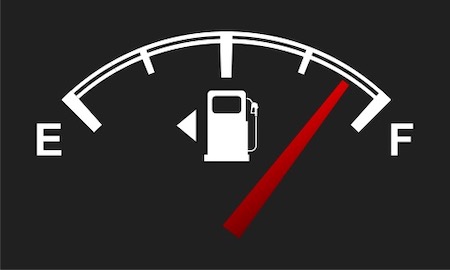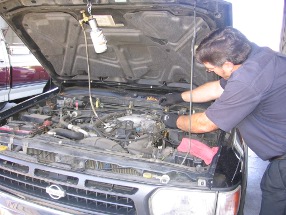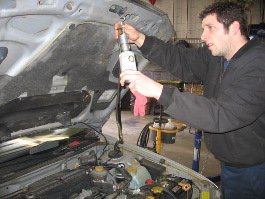As a vehicle owner, you take on the responsibility of maintaining it to ensure it continues to run well. Routine maintenance includes a variety of things:
- Filling it with gas
- Changing the motor oil
- Filling the reservoir with windshield washer fluid
- Keeping the tires properly inflated
- Replacing the tires from time to time
- Replacing the brake pads
- Doing a fluid check for each of the major systems
Some maintenance items become almost automatic. You understand the car needs gasoline to keep running, so you make stopping by a filling station a part of that routine.
Other maintenance items aren’t as well known.
Like fuel system cleaning.
It’s not something that’s commonly promoted through local repair shops. And yet it’s an important part of keeping your car operating well.
A quick search will show you there’s a lot of variance as to when it should be performed. One resource says fuel system cleaning should be done annually. Another thinks it should be cleaned around 45,000 miles or three years, whichever occurs first. Still another says a car can drive 60,000 miles or more before considering a fuel system cleaning. Who should you believe?
Start with your owner’s manual. Your car’s manufacturer knows best when it comes to the inner workings of your vehicle.
You can also speak with one of our mechanics. It’s our job to inspect your car thoroughly, and let you know if the fuel system needs a little TLC.
The fuel system
The fuel system provides the lifeblood to keep your car moving. If a piece of the fuel system is compromised, it won’t allow the fuel to flow properly throughout the system, putting other parts of the system at risk.
The fuel system starts with the gas tank. It’s a reservoir that holds either gasoline or diesel, depending on the car you’re driving.
The fuel lines carry fuel from the reservoir to the engine. Fuel filters are built into the system to capture tiny impurities that may flow through the lines, to ensure pure fuel makes it into the injectors for optimal performance.
Fuel pumps give the system power. They push gas through the fuel lines, past the fuel filters, and through the fuel injectors.
The fuel injectors have tiny nozzles that allow a fine spray of fuel to move into the cylinder. As this happens, the spark plug causes the spark that ignites the fuel and causes power to surge throughout the system, bringing your car to life.
The fuel injectors mimic a fine aerosol spray, similar to how a can of hairspray might work. Over time, these tiny nozzles can get clogged, which causes the spray function not to work as intended. Instead of a fine mist, it turns into harsher sprays concentrated in certain areas. It takes more gas to create the power necessary for the same action. And that starts your vehicle down the road to inefficiency.
Is fuel system cleaning necessary?
When you search online, you can find advice covering a full spectrum. Some will tell you fuel system cleaning is critical for performance. Others will tell you it isn’t necessary to keep your car running smoothly.
If you use hairspray regularly, you know that some cans can work from beginning to end without a problem. At other times, you have to work at it to keep it spraying a fine mist every time you press down on the nozzle.
The fuel system may work flawlessly … for a while. The older your vehicle is, the longer you drive it without cleaning it, the more likely it will be to start wearing down.
There isn’t a harsh rule for when you should schedule a fuel system cleaning. But just because there isn’t a steadfast rule, doesn’t mean you should ignore it either. Like other systems, paying attention to your vehicle will alert you to potential problems. If you notice signs that indicate the fuel system might be the center of the issue, a fuel system cleaning may be just what your vehicle needs.
Some of the signs you can watch for include:
- Your car’s gas mileage starts decreasing without other factors at play. You’re filling up more even though your driving hasn’t changed.
- Your car seems to be losing power. It doesn’t have the same drive as it once did during your normal driving routines.
- Your car doesn’t always start up with the first turn of the key. It sounds a little rough during the startup phase.
- You notice your car struggles to keep up with you as you accelerate.
- Your engine hesitates when you step down on the accelerator to push your car into action.
Once you notice a problem, pay attention to it. Does it worsen over time? It may be time to schedule a maintenance visit, have your car inspected, and consider a fuel system cleaning to ensure it continues to work well.
The benefits of fuel system cleaning
Because it takes time for parts to wear down, when your vehicle finally needs fuel system cleaning, it’s a chance to replace older parts. Just like motor oil that breaks down and turns grimy, or tires that lose tread and put you more at risk, a fuel system cleaning ensures all parts of the fuel system are in great working condition. They make your car more efficient once again.
If one part isn’t working correctly, it adds more stress to the other parts in the system. By cleaning the system and ensuring everything is working well, you’re increasing the life of every part in the system.
An efficient fuel system means it takes in and processes gasoline as efficiently as possible. This is why it’s important to pay attention to your gas mileage. If you fill up more frequently and notice your gas mileage is waning, it’s a good sign of a problem. Fixing it will make the entire fuel system operate better, and make your vehicle more efficient.
If the system uses gas efficiently, it also reduces the emissions it releases into the air. That makes your car as clean as possible as it takes you on your daily routine. It’s better for your car, and for the planet too.
Is fuel system cleaning in your future?




